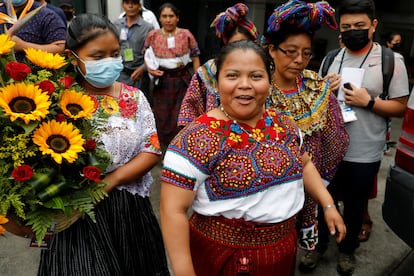Juanita Alonzo: The Guatemalan migrant wrongly jailed in Mexico for 2,700 days
The 33-year-old spent nearly eight years in prison after being forced to sign a kidnapping confession in a language that she did not understand. She tells EL PAÍS how she managed to survive the experience

The last thing Juana Alonzo ate inside a prison in the Mexican state of Tamaulipas was some tamales. She had just been told that she was free to go after almost eight years in prison for a crime she did not commit. A long time has passed since she had her first meal at the Reynosa penitentiary: a sandwich wrapped in plastic. “They [the police] threw it at me as if I were a dog, angrily,” says Alonzo in a videoconference with EL PAÍS. She is standing beside her family in San Mateo Ixitán, an indigenous community in Guatemala near the border with Mexico. The community is celebrating her return with flowers and marimba music. It has taken longer than expected for her to come back, but she is now home. It is one of the few migrant stories with a happy ending.
Alonzo was 26 years old when she left San Mateo and headed north for Atlanta, Georgia in the United States. Like many, she was chasing the American dream: dollars and food for her family. Together with 20 other people, she traveled 1,800 kilometers to the city of Reynosa in Tamaulipas. Exhausted and with a severe headache, she was unable to make the final crossing with the others. They left her waiting in a house a dozen kilometers from the border. At the house, there was a woman from El Salvador who asked Juanita for her cellphone. She used it to call 911 and warn authorities that she had been kidnapped. Police soon surrounded the house.
“They had masks, helmets, they were well-armed, with guns, they grabbed me, threatened me, beat me, tortured me,” recalls Juanita. “They hit me on the head, kicked my back, everything. It reached a point where I could not feel anything anymore.”
“I did not understand what was happening, because when they captured me I did not have a translator with me, nor did I have [access to] the [Guatemala] consulate,” she explains. “From the beginning, they made a lot of mistakes with me.”
Juanita’s native language is Chuj, a dialect of the Mayan family. At the time, she didn’t know a word of Spanish, much less that she was signing a confession to kidnapping. “They forced me to sign all the papers. They violated my rights,” she says now in a broken but charming Spanish, filled with expressions she learned in prison.
She learned to speak Spanish “little by little with the girls,” she says in reference to her fellow inmates. When Alonzo felt lonely in the Reynosa prison, these women helped her get through her lowest moments. They loaned her clothes, paid her to do their washing and taught her how to knit. “They gave me a lot of encouragement. ‘Chin up, Juanita,’ the girls told me. I cried almost every day, if not in the morning, then in the afternoon or at night. I missed my family a lot, they were suffering for me,” she says. “Living in that prison is very difficult, it’s not easy at all.”
When she was at rock bottom, her fellow inmates suggested that she had perhaps escaped a worse fate given the dangers of migrating to the US. “My fellow Guatemalans were being killed, kidnapped, on the way there,” says Alonzo.
But her fate changed on May 18, when Mexican President Andrés Manuel López Obrador ordered her immediate release. The inmates ran to tell her the good news: she was going to be free, the president had said her name on television.
López Obrador’s decision followed a ruling by the United Nations Working Group on Arbitrary Detention in September 2021, which ordered Mexico to release her within a maximum period of six months. By the time the president announced her release, eight months had already passed. And so, after 2,700 days – nearly eight years in total – Alonzo was free to go. The 33-year-old says a court clerk told her the news, but she still couldn’t believe it, and demanded to see her release papers. “And she [the court official] took out the paper, and I said ‘oh wow I’m going free!’ I turned to see the guards and they were crying and then they hugged me: ‘I’m very happy for you my dear, I know you’re innocent, thank God you’re going free,’” she recalls of the scene. “Oh, I’m very excited, very happy because they gave me my freedom.”
In the first few minutes of the interview, Alonzo says the word “free” 17 times and still doesn’t believe it. She remembers the exact time that it became official: 3.45pm on May 21. She ran out to tell the other inmates and quickly packed up, leaving most of what she had accumulated in the past seven and a half years in prison. “It was very fast, [I told them,] ‘Do what you want with my things, I don’t want anything to do with them, I’m free,’” she recalls, laughing. Waiting outside the prison were staff from the Guatemalan consulate, her lawyers and members of human rights organizations. Alonzo says she was too excited to eat or sleep on her first day out of prison. “Also,” she confesses. “I was very scared about flying in a plane.”
After two plane trips and two days, Alonzo finally arrived in San Mateo, where her arrival was celebrated by the whole town and her sick mother rushed to embrace her. Now Alonzo is seeking compensation for the years that were stolen from her and the pain they caused. “That’s the most important thing, but I’m free and I’m very happy right now.”
Tu suscripción se está usando en otro dispositivo
¿Quieres añadir otro usuario a tu suscripción?
Si continúas leyendo en este dispositivo, no se podrá leer en el otro.
FlechaTu suscripción se está usando en otro dispositivo y solo puedes acceder a EL PAÍS desde un dispositivo a la vez.
Si quieres compartir tu cuenta, cambia tu suscripción a la modalidad Premium, así podrás añadir otro usuario. Cada uno accederá con su propia cuenta de email, lo que os permitirá personalizar vuestra experiencia en EL PAÍS.
¿Tienes una suscripción de empresa? Accede aquí para contratar más cuentas.
En el caso de no saber quién está usando tu cuenta, te recomendamos cambiar tu contraseña aquí.
Si decides continuar compartiendo tu cuenta, este mensaje se mostrará en tu dispositivo y en el de la otra persona que está usando tu cuenta de forma indefinida, afectando a tu experiencia de lectura. Puedes consultar aquí los términos y condiciones de la suscripción digital.









































